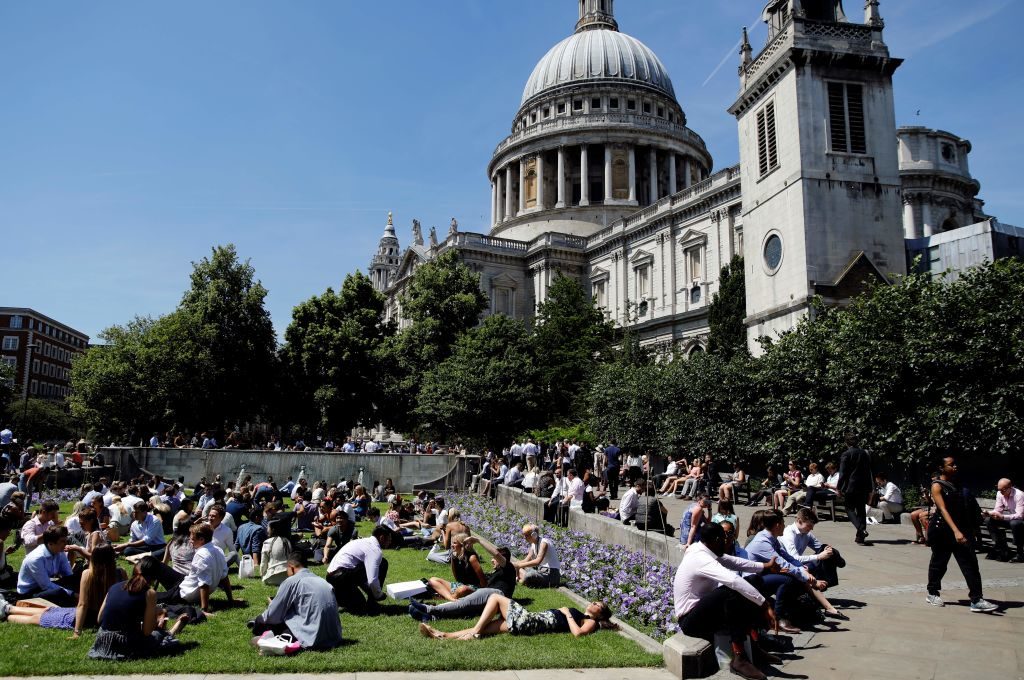Dr Johnson, who was right about so many things, was certainly correct about London: when a man is tired of London, he said, he is tired of life.
I have been in that great metropolis for the last few days and I am once again impressed by the truth of Johnson’s declaration. Not for the first time, however, I find myself asking myself why I am so impressed.
Plenty of other cities have conspicuous charms. Paris, for example, is in many ways more beautiful and picturesque than London, more patently sensual, not to say sybaritic. New York is more virile and commanding.
But London, for a Yankee like me, exercises a special fascination. One of these days I will sit down and try to plumb the lineaments of that fascination. The French philosopher Gaston Bachelard once wrote a book with the fetching title The Psychoanalysis of Fire (La psychanalyse du feu). Just between us, the title is better than the book. But I suspect that a Bachelardesque phenomenology might go some distance in elaborating the distinctive qualities of London and indeed of England generally for a susceptible New Englander.
I am not going to embark upon that analysis now. But padding about London on the 243rd anniversary of the adoption of the Declaration of Independence by the Second Continental Congress prompts me to reflect on some notable affiliations between Blighty and the United States.
The big question here in London just now revolves around Brexit, which is to say the future of British sovereignty.
Does it have a future? Until recently, I though the answer to that question was yes. A grateful corroborating moment came in June 2016, when more people here voted for Brexit than had ever voted for anything in the storied history of these favored isles. I happened to be in London then. Like my coterie of right-leaning friends, I danced on tenterhooks on the run-up to the vote, predicted (though with fingers crossed) that the referendum would go for Brexit, and wrote many celebratory articles about it when it turned out that I called that one correctly. It was an honor and a privilege to have been the instrument through which the great Brexiteer Dan Hannan got outside his first glass of champagne in 18 months, having previously girded up his loins and sworn off the fructum vitis until such time as Brexit passed and the will of the British people successfully reasserted itself.
That was three years ago. What happened? The lumbering impedimenta of the administrative state, European edition, happened, that’s what. The Remainers, initially shocked by this blow to their prerogatives, woke up and closed ranks. ‘Brexit means Brexit,’ said Theresa May, the hapless outgoing prime minister, whose bumbling, half-hearted feints assured that her inner Remainer remained dominant in her negotiations to perpetuate the status quo and frustrate the will of the people while pretending to respect it.
Mrs May will be history in a couple of weeks and tout le monde is wondering what, or rather who, comes next. The chief, indeed the only contenders at this point are Jeremy Hunt, Mrs May’s foreign secretary, and the polymathic moppet Boris Johnson, the journalist, former mayor of London, and Mr Hunt’s predecessor as Mrs May’s foreign secretary. Nine out of 10 people say that Boris will be the next prime minister. I think they are right, and I rejoice, since I think that Boris will be a breath of fresh air and that he will, as promised, deliver Britain from its soft servitude to the EU by October 31 of this year.
Fairness requires that I acknowledge that approximately every 10th person loathes Boris Johnson and believes — or at least hopes — that he will somehow come a cropper before the vote later this month. One wretched neighbor recorded a row between Boris and his girlfriend, sent the audio to the Guardian, and sat back in smug self-satisfaction when the story became a sensation.
Alas for them, the sensation was as evanescent as a bad odor on a windy day and now, on July 4, it seems almost certain that Boris will prevail.
As I say, I think that, all things considered, that would be a good thing because Boris, despite his foibles, is a younger, better-educated, and more playful version of the American dynamo Donald Trump. Both men are benign nationalists — what we used to call patriots — and both exhibit the flexible idealism of the settled pragmatist. In the case of Donald Trump, the results of that pragmatism—what he himself has denominated ‘principled realism’ — is a vibrant economy of historic dynamism, a new spirit of national self-confidence, and a widespread if grudging respect for American power on the world scene.
There is no time that cannot be improved by reminding ourselves what a silly, partisan fool is Paul Krugman, Nobel Laureate in economics for that Democratic public relations firm, The New York Times. In the wee hours of November 9, 2016, Krugman bitterly observed that, were he asked when the market would recover from the insult of Donald Trump’s election, a good first answer was ‘probably never.’ The Dow Jones average was then 18,000 and change. It pleases me to note that it closed yesterday, July 3, at an all-time high of 26,966.
I mention this to back gently into the larger, international issue that gentle nationalists like Trump and Boris Johnson raise. It is, in a word, the beneficent potency of the Anglosphere. Sitting in London on this Independence Day, I am struck anew by the vistas of opportunity that are opening up before countries that have traded-in the shopworn servitude of transnational progressivism for the clear-eyed realities of national self-interest. Later today, Americans will be treated to the spectacle of a military parade in Washington. Some of president’s critics complain that this is an unseemly, macho display of power, more appropriate for a despotic country like Russia or North Korea than the United States. In fact, such displays of military splendor have been a common occurrence in America, from the rockets’ red glare and bombs bursting in air commemorated by Francis Scott Key’s Star Spangled Banner to the parades that greeted Dwight Eisenhower’s inauguration and the conclusion of the First Gulf War.
Trump’s parade will be a celebratory event, cheering to patriotic hearts across the country, chafing to those who believe that human progress requires that we leave national sentiment behind us in order to embrace the utopia of a world without borders, which is also a world without citizens but heavily populated by unaccountable bureaucrats who seek to run our lives.
Clicking through the news this morning, I came across a loathsome little screed called ‘Let Us Reject the Ugly Nationalism of Independence Day.’ I won’t mention its author or link to the story but will reproduce its opening sentence. ‘The United States’s Independence Day celebrations are marked each year by gaudy displays of red, white and blue, violent-sounding fireworks and inaccurate claims of America being the world’s greatest country.’ Oh dear. That is the astringent, killjoy sentiment of a terminally querulous soul. Doubtless the author of that wretched piece applauded the action of the athletic shoe maker Nike, which removed images of the Betsy Ross American flag from a line of sneakers when the unemployed footballer Colin Kaepernick complained about the flag. As David Harsanyi noted, Kaepernick, ‘sacrificed everything” by making tens of millions of dollars as a corporate-sponsored activist, complained to company officials that the Betsy Ross flag on the back of a proposed sneaker was an offensive symbol because of its “connection to an era of slavery.”’ Pathetic, isn’t it?
Being in London on Independence Day reminds me not of the historic animosities that once divided our countries but the deep currents of enlightened self-interest, articulated in the magnificent syllables of the English language, that have, for more than two centuries, brought us together. Excelsior!

























